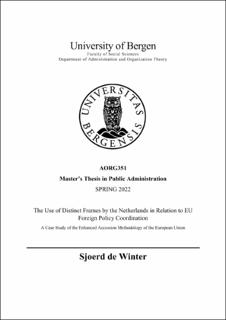The Use of Distinct Frames by the Netherlands in Relation to EU Foreign Policy Coordination. A Case Study of the Enhanced Accession Methodology of the European Union.
Master thesis
Permanent lenke
https://hdl.handle.net/11250/3002302Utgivelsesdato
2022-06-15Metadata
Vis full innførselSamlinger
- Master theses [88]
Sammendrag
This thesis examines when, how, and why the Netherlands uses distinct frames during internal and external coordination in relation to European Foreign Policy. Building on an extensive discussion on the theoretical conceptualisation of coordination and framing, this case study compares the use of frames and framing devices by the Netherlands in light of the Enhanced Accession Methodology of the European Union. The thesis has a qualitative research design, and data was primarily collected through semi-structured interviews with key actors and academics, as well as through document analysis. The data is analysed through pattern-matching by comparing theoretical propositions as presented in the theoretical framework to the data as discussed in the empirical chapter. The study finds that all four dimensions (i.e. internal, external, vertical, horizontal) of coordination are applicable to the case, depending on the framing device (i.e. sense-making, selecting, naming, categorising, storytelling). The study also finds that the Netherlands has a sceptical approach to EU enlargement in general and fears a destabilisation of the European Union and the functioning thereof due to a precipitous accession of candidate Member States. This has led to the use of the ‘rule of law’, ‘conditionality’, and ‘merits’ frames, as well as the ‘strict, fair, and engaged’ categorisation frames. The data shows that the ‘rule of law’ frame is used similarly throughout internal and external coordination, while ‘conditionality’ and ‘merits’ are used more positively during external coordination – focusing on rewarding the candidate states in case of positive progress and developments. During internal coordination, these two frames are used more negatively – emphasising that negative progress and backsliding lead to sanctions and a reversing of the accession negotiation process. The somewhat negative ‘strict’ categorised frame is used more during internal coordination to assure the enlargement-sceptic population and Parliament, whereas ‘fair’ and ‘engaged’ are used more during external coordination to prevent being perceived as unconstructive.
